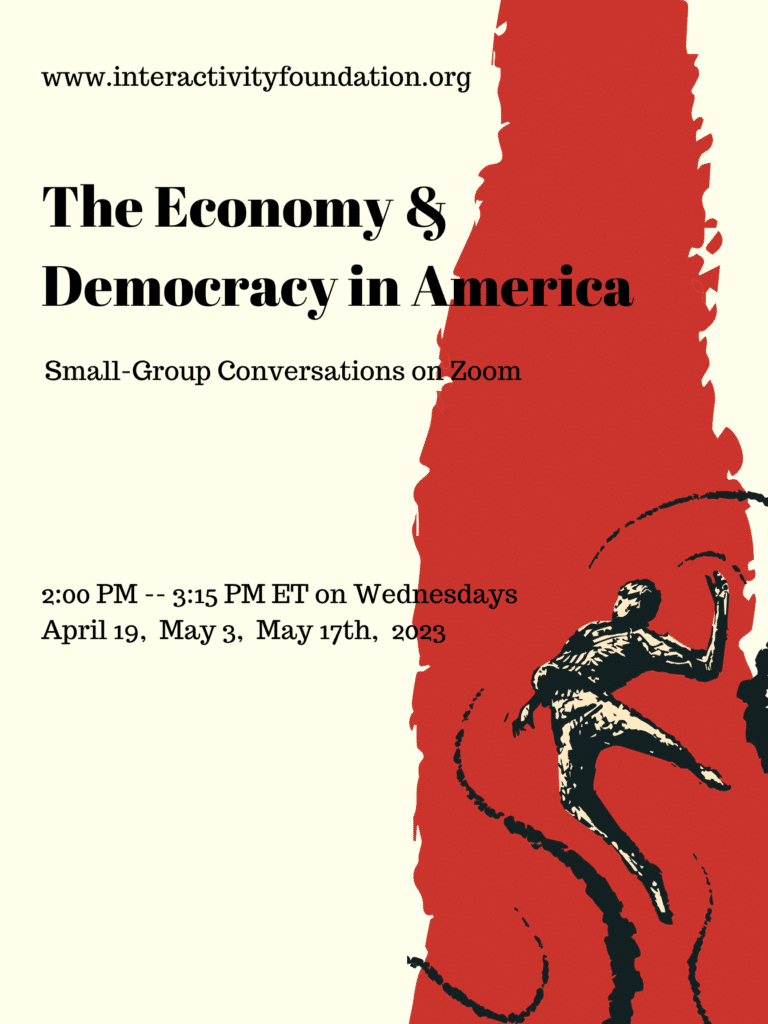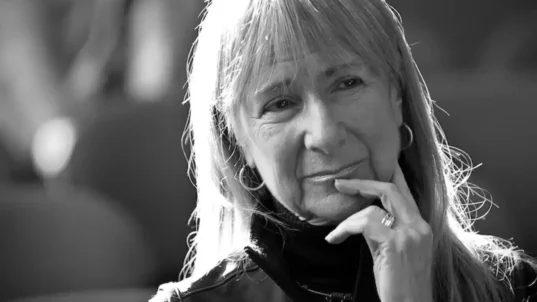
What does the American Dream mean to you? In the 2nd of three sessions of our small-group conversation series on the relationship of the Economy & Democracy in America, participants focused on questioning what we mean by “The American Dream” and exploring the assumptions, myths, dreams, and stories that we tell ourselves about the economy and our democracy. In addition to discussing different visions or versions of The American Dream, participants also explored other, related concerns and challenges to The American Dream as well as some initial ideas for updating it. Below is a summary of the different ideas and common themes that emerged from each small-group’s discussion in this second session.
Please join us for the third and final discussion in this 3-part series, which will be held this coming Wednesday, May 17th, at 2:00 pm ET. In this final session, we’ll ask participants to explore how our economic system might better support our democratic values rather than the other way round. What might this world look like? And how might we get there? You can register for this 3rd session HERE.
Discussion Summary
What do you think of when you think of the “American Dream?” What does it mean to you?
In significant part, it means economic opportunity and advancement for all
- America as the land of opportunity
- Opportunities for work, education, a middle-class lifestyle, etc.
- If you work hard, play by the rules, you can get ahead and climb the economic ladder, achieving anything you want
- Upward economic mobility should continue across generations: you will be better off than your parents, and your children will be better off than you
- Upward economic and social mobility: you have the opportunity to become a member of at least the “middle class” and maintain that membership or status
- Your basic economic needs are met—food, housing, safety, health care, education— “and then some”
- In traditional and material terms: having a job with a living wage and benefits or own your own business; an affordable mortgage on a single-family home, preferably in the suburbs; one or two cars and a garage; a lawn to mow, good public schools; affordable opportunities for college for your kids; access to health care; retirement with dignity; and some amount of time for recreation and leisure—vacation, volunteering, community service, hobbies, etc.
What are some other aspects of the American Dream?
It means equal opportunity and equality generally
- Believing in an equal economic playing field where it just takes your personal effort to make more of your life
- Believing that anyone can make it here if they work hard enough–regardless of geographic origin, ethnicity, gender, other social status, etc.
- We welcome immigrants, newcomers generally, and new ideas
- Includes equal legal, political and civil rights, including freedom of speech, religion, association, and assembly; rights to due process, equal protection of the laws, self- determination, personal safety and autonomy etc.
It means personal responsibility
- It’s up to each person to take advantage of the opportunities to achieve the American Dream, with no handouts from the government
- People come from all over the world to pursue their dreams here by their own efforts
- The American Dream is an individual concept, and only individuals have responsibility for it
It also means freedom to:
- Pursue your own dreams, passions, interests, to seek your level of success
- Live your life as you want; being able to do what you want
- Not be limited by law, society, or tradition in obtaining work, pursuing your dreams, etc.
It has changed
- The upward economic mobility of prior generations may no longer be possible for younger generations
- All our basic needs cost significantly more, housing, health care, and especially education, so the American Dream increasingly out of reach for many
- It’s different for every generation, younger generations may—
- feel that the American Dream is only a historical legend and not something attainable or relevant for them
- have different ideas of what constitutes economic or social success, some of which may be less focused on acquiring material goods to signify social standing
- question the value of constant economic growth and choose to consume less
- External factors are changing the American Dream: global warming, war in Ukraine, the pandemic, etc.
- A mix of different lifestyle choices and ways to live together in different kinds of communities
- The American Dream is over–we now live in an oligarchy of the rich
- The American Dream is not over because it’s not about working for money or things but rather for personal fulfillment
- The American Dream is alive for immigrants; it’s a significant motivation for them to come here to pursue that dream
- Perceptions of the American Dream are shaped by our economic circumstances, and many immigrants come from poorer economic circumstances or less democratic freedom, so the American economy and democracy provide significant opportunities for advancement
- For many immigrants, the experience of the American Dream may encompass a broader sense of community, extending to neighbors, friends, colleagues, which may help in reducing the sense of isolation
How does the American Dream relate to democracy?
Democracy is a necessary, integral part of the American Dream
- Can’t maintain the economic part of the American Dream without democracy
- The American Dream is associated with liberty, so the economic part is in tandem with the democratic part
- They’re connected: can’t imagine economic satisfaction without democracy
- Without basic individual civil rights, there would be “pushback,” a revolt
- Democracy is very messy but much more stable and, in the long run, supportive of overall economic well-being for all
- Alternatively, other countries (like China) have shown that the market economy doesn’t necessarily have to be linked to democracy
- They may not be linked in other parts of the world
The democratic component of the American Dream is—or should/could be—a larger ideal transcending borders, generations, and our individual notions of material wealth
- Democracy, in some form, is necessary to ensure the world will be a better place for our descendants: safer, more sustainable, less insecure
- Part of the American Dream calls us to make a better world with more opportunity for all and especially for future generations
- In a democracy, the government, the media, corporations all have responsibility for making the American Dream more possible for more people
What assumptions or beliefs about our economy and democracy relate to the American Dream?
The assumption of meritocracy: that all inequalities can be overcome with hard work and good intentions
- Anyone can achieve the American Dream if they just try hard enough
- The flip side: if you fail, it’s just because you didn’t try hard enough
- The meritocracy belief Ignores the realities of discrimination and inequalities based on race, ethnicity, gender, religion, geography, accent, family wealth and social connections, etc.
The belief that inequality can be overcome solely through government intervention and without reliance on individual beliefs and efforts
- Individuals have to make the effort as well
- They also have to believe in themselves, that they are equal
The belief in rugged individualism–that everyone can and should pull themselves up by their own bootstraps
- A cultural preference for competition, survival of the fittest, over collaboration or cooperation
- Believing that success or failure are determined solely by individual effort and initiative
- Relying on individual competition as a model for our economic markets, policy choices (the “marketplace of ideas”), and often even our determinations of social and moral standing (those with economic success, or even just inherited wealth, are seen as morally superior)
- Our history suggests a more complicated reality: the idealized version of the rugged individual conquering the American West, for example, depended on the US government engaging in genocide of native peoples to clear the land
- We have often and necessarily relied on—and continue to rely on—important collaborative and cooperative efforts to establish and maintain—
- Personal safety, property rights, the rule of law in general
- Transportation: roads, railroads, etc.
- Public education from kindergarten through university
- Utilities: water, sanitation, electric power,
- Functioning markets, which only function with government regulation and enforcement
- It’s wrong to put all responsibility on the individual since we, as a society, have created and maintained an uneven playing field and placed so many obstacles in the path of advancement for others
Our beliefs about the importance, the value of work and its role in our lives
- In America, we have a strong culture of “Workism,” where we live to work and more work should always take precedence over other needs and goods
- Workism shows up in the practice and celebration of working more than 40 hours per week, working multiple jobs or gigs, and not taking time off
- Relatedly, the Protestant Work Ethic encourages us to see economic success as a sign of God’s favor or of superior moral character—and vice versa, economic hardship as a sign of moral failing
- We stigmatize those who are economically unsuccessful, who are unemployed, or doing unpaid labor
- The linkage between economic sufficiency and human dignity affects our feelings of self-worth: there are immense psychological costs when we’re not economically successful or stable
Keeping up with the Joneses
- The emphasis on materialism has often led to conspicuous consumption and over consumption, solely in order to signal one’s continuing or rising economic and social standing
- This may be different for younger generations, many of whom may not have the choice to acquire as much stuff or may redefine the American Dream in far less material terms
Whose dream is it? Who is left out, and who has responsibility for it?
Groups who often get left out of the American Dream
- Future, or even current, generations may feel left out as economic circumstances make it more challenging to acquire and maintain the basic needs of housing, health care, and education, among other material goods and services
- The economically disadvantaged, the underclass, the homeless—many of whom may view the American Dream as unattainable
- Those who have been historically and systemically excluded from full and free participation in our economy, like racial minorities, Native Americans, undocumented migrants, etc.
- Those with no or limited access to education
- People without access to affordable health care
- Those left behind by generations of stagnant or declining economic prospects
- Veterans struggling to get health care, housing, and assistance for their injuries and lost opportunities
- Regular citizens who don’t have the resources to compete in our democracy against the economic and political power of corporations, wealthy individuals, or other special interest groups
Shifting responsibilities for the American Dream
- The American Dream used to be framed as an individual endeavor: you work hard and you provide for yourself and your family (it didn’t necessarily include a vision of contributing to sustainable communities)
- Alternatively, responsibility for the American Dream has shifted from shared responsibility toward pushing all the burdens onto individuals and their families: e.g, college costs, retirement costs, etc.
- The government has always had a role in supporting the American Dream—or at least for certain interests or groups
What challenges do we see for the American Dream?
The longer-term effects of capitalism on both our democracy and our economy
- Neither the environment nor the working populations that fuel our economy can continue to support the current and rising levels of consumption and waste
- Rising disparities in income and wealth and unprecedented extraction and concentrations of wealth in corporations, in monopolies, and a narrow investor class–all of whom wield vastly disproportionate and self-interested control over our democracy
- The corresponding decline of the power of labor, labor unions, and worker income relative to economic growth and productivity
- The control and precedence that our economy (and those who control it) takes over our democracy and the workers and families who sustain it: our democracy is increasingly subservient to the interests of those who control the economy rather than the other way around
- Vulture capitalism: privatizing the gains, socializing the losses, and selling off the parts
- Rising levels of economic insecurity or fragility, with more families living paycheck to paycheck and only one health care bill away from bankruptcy
- The rising unaffordability of the American Dream: the significantly rising costs of health care, housing, education, childcare, elder care, home health care, food, etc.
Rising sectarianism, culture wars, hatred toward women, minorities, immigrants, and others
- Increasing levels of social controls being put in place to limit the rights of these and other outgroups
- Growing levels of frustration, disillusionment, and anger: a lot of people feel that they have been cheated by the ruling class and by the notion of the American Dream
- The American Dream is racially disenfranchising: your ability to achieve it is often dependent upon your race and zip code
- The unsustainable tension between the realities of unequal opportunity versus the myth, hope, and expectation of equal opportunity
Looking ahead: initial thoughts on a revised version of the American Dream?
- Make our economy serve our democracy, our people, and other living beings
- Use a Universal Basic Income to provide all citizens with food, shelter, healthcare, education, etc.
- Ensure the rights of other living beings so they have the space and resources to survive and thrive by putting a monetary value on the environment
- Move away from a growth-based, consumption-based economy and toward an economy that balances human needs and desires with other living beings
- The goal should remain to provide a level playing field of opportunity, to give people the freedom and opportunity to realize their own dreams and aspirations; where individuals go from there is up to their own efforts
- We should ensure that everyone has access to basic housing, education and healthcare
- Improve and support education on civics, personal responsibility, the true history of our country, and our increasingly diverse and multicultural society
- Shift the dream away from a materialistic one toward a more humanistic vision where we work, live, and come together as humans in community; a vision of mutualism where people are looking out for, and taking care of, one another
- Consume less, produce less waste, minimize, de-grow our economy
- Go local: Shift our economic focus to more localized economies (for our food systems for example), and increase participation and engagement in all aspects of democracy: e.g., school boards, community organizations, township and municipal government
- Work on our reducing our divisions and increasing our sense of unity; we need more tolerance and openness to other people’s ideas
- Broaden our dreams, hopes, and expectations beyond our borders; recognize that we live in a global economy and society


